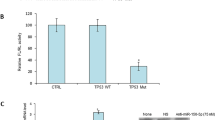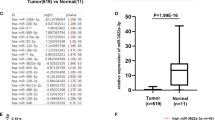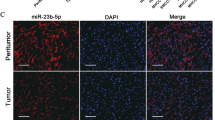Abstract
MicroRNAs are a class of small non-coding RNAs that regulate the expressions of many genes. Previously, we found that the expression of p55PIK, an isoform of phosphatidylinosotol 3-kinase that has important roles in the regulation of cell cycle, is increased significantly in several types of cancer and contributes to the tumor growth. However, the mechanism for this increased p55PIK expression is not well understood. In this study, we show that miR-148b binds specifically to the 3′-untranslated region of p55PIK and significantly suppresses p55PIK expression. MiR-148b overexpression abolished p55PIK stimulation of cell proliferation and cell cycle progression in colorectal cancer (CRC) cell lines and decreased tumor growth in vivo. Furthermore, we demonstrated that p53 directly activates the transcription of miR-148b by binding to its promoter. In CRC cell lines and tissues, p53 expression was associated with miR-148b expression, and both were negatively associated with p55PIK expression. Our study shows that the p53/miR-148b/p55PIK axis has an important role in cell proliferation and tumor growth, and may represent a novel therapeutic target for treating cancers containing p53 mutations or losses.
This is a preview of subscription content, access via your institution
Access options
Subscribe to this journal
Receive 50 print issues and online access
$259.00 per year
only $5.18 per issue
Buy this article
- Purchase on Springer Link
- Instant access to full article PDF
Prices may be subject to local taxes which are calculated during checkout







Similar content being viewed by others
References
Bartel DP . MicroRNAs: genomics, biogenesis, mechanism, and function. Cell 2004; 116: 281–297.
Gregory RI, Shiekhattar R . MicroRNA biogenesis and cancer. Cancer Res. 2005; 65: 3509–3512.
Croce CM, Calin GA . miRNAs, cancer, and stem cell division. Cell 2005; 122: 6–7.
De Santa F, Iosue I, Del Rio A, Fazi F . microRNA biogenesis pathway as a therapeutic target for human disease and cancer. Curr Pharm Des 2013; 19: 745–764.
Volinia S, Calin GA, Liu CG, Ambs S, Cimmino A, Petrocca F et al. A microRNA expression signature of human solid tumors defines cancer gene targets. Proc Natl Acad Sci USA. 2006; 103: 2257–2261.
Lu J, Getz G, Miska EA, Alvarez-Saavedra E, Lamb J, Peck D et al. MicroRNA expression profiles classify human cancers. Nature 2005; 435: 834–838.
Ng EK, Chong WW, Jin H, Lam EK, Shin VY, Yu J et al. Differential expression of microRNAs in plasma of patients with colorectal cancer: a potential marker for colorectal cancer screening. Gut 2009; 58: 1375–1381.
Chang H, Zhou X, Wang ZN, Song YX, Zhao F, Gao P et al. Increased expression of miR-148b in ovarian carcinoma and its clinical significance. Mol Med Rep 2012; 5: 1277–1280.
Nymark P, Guled M, Borze I, Faisal A, Lahti L, Salmenkivi K et al. Integrative analysis of microRNA, mRNA and aCGH data reveals asbestos- and histology-related changes in lung cancer. Genes Chromosomes Cancer 2011; 50: 585–597.
Song Y, Xu Y, Wang Z, Chen Y, Yue Z, Gao P et al. MicroRNA-148b suppresses cell growth by targeting cholecystokinin-2 receptor in colorectal cancer. Int J Cancer 2012; 131: 1042–1051.
Szafranska AE, Davison TS, John J, Cannon T, Sipos B, Maghnouj A et al. MicroRNA expression alterations are linked to tumorigenesis and non-neoplastic processes in pancreatic ductal adenocarcinoma. Oncogene 2007; 26: 4442–4452.
Song YX, Yue ZY, Wang ZN, Xu YY, Luo Y, Xu HM et al. MicroRNA-148b is frequently down-regulated in gastric cancer and acts as a tumor suppressor by inhibiting cell proliferation. Mol Cancer 2011; 10: 1.
Pons S, Asano T, Glasheen E, Miralpeix M, Zhang Y, Fisher TL et al. The structure and function of p55PIK reveal a new regulatory subunit for phosphatidylinositol 3-kinase. Mol Cell Biol 1995; 15: 4453–4465.
Zhang L, Huang J, Yang N, Greshock J, Liang S, Hasegawa K et al. Integrative genomic analysis of phosphatidylinositol 3'-kinase family identifies PIK3R3 as a potential therapeutic target in epithelial ovarian cancer. Clin Cancer Res 2007; 13: 5314–5321.
Zhou J, Chen GB, Tang YC, Sinha RA, Wu Y, Yap CS et al. Genetic and bioinformatic analyses of the expression and function of PI3K regulatory subunit PIK3R3 in an Asian patient gastric cancer library. BMC Med Genomics 2012; 5: 34.
Hu J, Xia X, Cheng A, Wang G, Luo X, Reed MF et al. A peptide inhibitor derived from p55PIK phosphatidylinositol 3-kinase regulatory subunit: a novel cancer therapy. Mol Cancer Ther 2008; 7: 3719–3728.
Hu J, Liu S, Wang J, Luo X, Gao X, Xia X et al. Overexpression of the N-terminal end of the p55gamma regulatory subunit of phosphatidylinositol 3-kinase blocks cell cycle progression in gastric carcinoma cells. Int J Oncol 2005; 26: 1321–1327.
Xia X, Cheng A, Akinmade D, Hamburger AW . The N-terminal 24 amino acids of the p55 gamma regulatory subunit of phosphoinositide 3-kinase binds Rb and induces cell cycle arrest. Mol Cell Biol 2003; 23: 1717–1725.
Wang G, Deng Y, Cao X, Lai S, Tong Y, Luo X et al. Blocking p55PIK signaling inhibits proliferation and induces differentiation of leukemia cells. Cell Death Differ 2012; 19: 1870–1879.
Wang G, Chen C, Yang R, Cao X, Lai S, Luo X et al. p55PIK-PI3K stimulates angiogenesis in colorectal cancer cell by activating NF-kappaB pathway. Angiogenesis 2013; 16: 561–573.
Muller PA, Vousden KH . p53 mutations in cancer. Nat Cell Biol. 2013; 15: 2–8.
He L, He X, Lim LP, de Stanchina E, Xuan Z, Liang Y et al. A microRNA component of the p53 tumour suppressor network. Nature 2007; 447: 1130–1134.
Hermeking H . MicroRNAs in the p53 network: micromanagement of tumour suppression. Nat Rev Cancer 2012; 12: 613–626.
Chang TC, Wentzel EA, Kent OA, Ramachandran K, Mullendore M, Lee KH et al. Transactivation of miR-34a by p53 broadly influences gene expression and promotes apoptosis. Mol Cell 2007; 26: 745–752.
Kim NH, Kim HS, Li XY, Lee I, Choi HS, Kang SE et al. A p53/miRNA-34 axis regulates Snail1-dependent cancer cell epithelial-mesenchymal transition. J Cell Biol 2011; 195: 417–433.
Chang CJ, Chao CH, Xia W, Yang JY, Xiong Y, Li CW et al. p53 regulates epithelial-mesenchymal transition and stem cell properties through modulating miRNAs. Nat Cell Biol 2011; 13: 317–323.
Kim T, Veronese A, Pichiorri F, Lee TJ, Jeon YJ, Volinia S et al. p53 regulates epithelial-mesenchymal transition through microRNAs targeting ZEB1 and ZEB2. J Exp Med 2011; 208: 875–883.
Zhao G, Zhang JG, Liu Y, Qin Q, Wang B, Tian K et al. miR-148b functions as a tumor suppressor in pancreatic cancer by targeting AMPKalpha1. Mol Cancer Ther 2013; 12: 83–93.
Russo A, Bazan V, Iacopetta B, Kerr D, Soussi T, Gebbia N et al. The TP53 colorectal cancer international collaborative study on the prognostic and predictive significance of p53 mutation: influence of tumor site, type of mutation, and adjuvant treatment. J Clin Oncol 2005; 23: 7518–7528.
Acknowledgements
This study was supported by National Natural Science Foundation (No. 81300411, No. 81372662, No. 81072431, No.81272278, No.31000612), '973' Program (No. 2009CB521802) and Program for Changjiang Scholars and Innovative Research Team in University (No.PCSIRT1131).
Author information
Authors and Affiliations
Corresponding authors
Ethics declarations
Competing interests
The authors declare no conflict of interest.
Rights and permissions
About this article
Cite this article
Wang, G., Cao, X., Lai, S. et al. Altered p53 regulation of miR-148b and p55PIK contributes to tumor progression in colorectal cancer. Oncogene 34, 912–921 (2015). https://doi.org/10.1038/onc.2014.30
Received:
Revised:
Accepted:
Published:
Issue Date:
DOI: https://doi.org/10.1038/onc.2014.30
This article is cited by
-
LPS/Bcl3/YAP1 signaling promotes Sox9+HNF4α+ hepatocyte-mediated liver regeneration after hepatectomy
Cell Death & Disease (2022)
-
Comparative Transcriptome Analysis of Spleen Reveals Potential Regulation of Genes and Immune Pathways Following Administration of Aeromonas salmonicida subsp. masoucida Vaccine in Atlantic Salmon (Salmo salar)
Marine Biotechnology (2022)
-
PIK3R3 regulates PPARα expression to stimulate fatty acid β-oxidation and decrease hepatosteatosis
Experimental & Molecular Medicine (2018)
-
MicroRNAs in colorectal carcinoma - from pathogenesis to therapy
Journal of Experimental & Clinical Cancer Research (2016)
-
Colorectal tumor molecular phenotype and miRNA: expression profiles and prognosis
Modern Pathology (2016)



